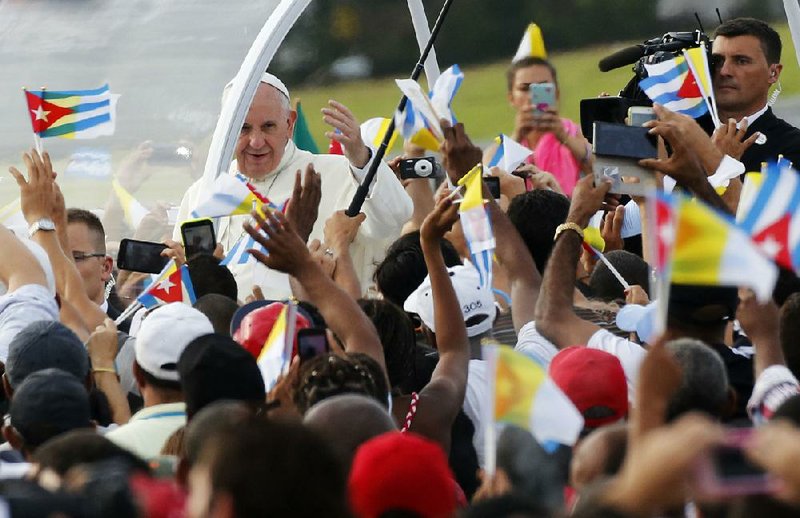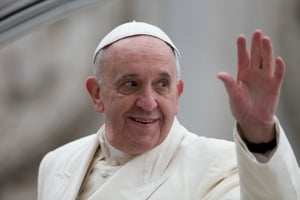HAVANA -- Standing in the symbolic heart of political Cuba, Pope Francis on Sunday began his first full day in the island nation with an outdoor Mass at Revolution Plaza attended by President Raul Castro and other leaders, and later met with the country's former leader, Fidel Castro.
At Revolution Plaza, Francis arrived about 8:30 a.m. in his familiar open-air popemobile, which moved through the crowd of thousands of people before delivering him to a covered stage for the service. Francis praised the vibrancy of the Cuban people and urged them to pursue a Christian model of selfless service.
He encouraged them to refrain from judging one another by "looking to one side or the other to see what our neighbor is doing or not doing."
"Whoever wishes to be great must serve others, not be served by others," he said. "Service is never ideological, for we do not serve ideas, we serve people.
"Being a Christian entails promoting the dignity of our brothers and sisters, fighting for it, living for it," Francis told the crowd. "That is why Christians are constantly called to set aside their own wishes and desires, their pursuit of power, and to look instead to those who are most vulnerable."
The scene blended faith, politics and revolution: Huge portraits of two revolutionary heroes, Che Guevara and Camilo Cienfuegos, overlook the square, which also had large banners of Jesus and Mother Teresa. Cristina Fernandez de Kirchner, president of Francis' native Argentina, also was in attendance.
In such a political setting, Francis made his most directly political remarks not about Cuba but on the Colombia peace talks underway in Havana. Francis urged negotiators for the Colombian government and the Revolutionary Armed Forces of Colombia to find a solution and end the decades-old conflict in their country.
"May the blood shed by thousands of innocent people during long decades of armed conflict" sustain efforts to find a definitive peace, Francis said at the end of the Mass. "Please, we do not have the right to allow ourselves yet another failure on this path of peace and reconciliation."
Colombian President Juan Manuel Santos, who has pushed the talks, issued a tweet in response to thank the pope "for your permanent prayers. We will continue on the road of peace and reconciliation."
The rebel leader, known by his alias Ivan Marquez, quoted the pope in a tweet of his own: "As the pope said: We don't have the right to allow another failure in this path of peace and reconciliation. We need a peaceful society."
In more than two years of negotiations, rebel and government negotiators have reached tentative agreements on land reform, how to combat drug trafficking and future political roles for guerrillas who lay down their weapons. The rebel movement also has largely adhered to a unilateral cease-fire in recent months, prompting the government to suspend aerial bombings of guerrilla camps.
But a number of obstacles remain to ending the half-century conflict, including whether rebel commanders behind scores of human-rights abuses will be punished with prison time.
In his remarks, Francis added a word of gratitude to Raul Castro for his efforts to assist the negotiations; the appeal was followed by a round of applause from the crowd.
Afterward, the pope went to the home of Fidel Castro for what was described as an informal visit with the leader of Cuba's 1959 revolution. A papal spokesman said Francis gave Fidel Castro a copy of his encyclical on the environment, "Laudato Si'," and several books. The meeting lasted about 40 minutes and included discussion about Francis' encyclical and the global economic system, according to the Vatican.
Unlike the 2012 visit of Benedict XVI, when Fidel Castro peppered the German theologian with questions, the meeting with Francis was more of a conversation, papal spokesman the Rev. Federico Lombardi said.
A photo provided by Alex Castro, Fidel's son and official photographer, showed the 89-year-old former president and Francis looking into each other's eyes as they shook hands, the pope in his white vestments and Castro in a white button-down shirt and an Adidas track jacket. Castro appeared to be gripping another, unidentified man for support.
Francis finished the day with a private meeting with Raul Castro, an evening vespers service in the San Cristobal Cathedral and a meeting with Cuban young people.
The pope spoke off the cuff at length for the first time during his trip to Cuba at the evening service, breaking from prepared remarks to deliver a sermon that focused on the importance of poverty to the Roman Catholic Church.
He also warned of the dangers of falling prey to the temptations of wealth.
In Francis' words: "Our dear mother church is poor. God wants it poor, as he wanted our Holy Mother Mary to be poor."
The head of the opposition group Ladies in White said Sunday that 22 of 24 members of her group who wanted to attend the Mass were prevented from going by Cuban security agents. And two other well-known Cuban dissidents said agents detained them after the Vatican invited them to the pope's vespers service.
Marta Beatriz Roque and Miriam Leiva received invitations from the office of the papal ambassador in Havana but said they were arrested as they tried to travel to the cathedral.
"They told me that I didn't have a credential and that I couldn't go to the pope's event that was taking place there in the Plaza of the Cathedral," Roque said.
Vatican spokesman Federico Lombardi said some dissidents were invited to events to receive a greeting from the pope, although not a formal meeting. He said the dissidents never showed up, but he could not confirm that it was because they were arrested.
Whether religious or not, many Cubans cited the pope as the main force behind the recent rapprochement between their country and the United States.
Andy Peraza Gonzalez, 34, a Catholic, had gone with his family to see the pope. "I think he is a great man. A person who focuses on the real problems of the world. He's been a great help to our country," Gonzalez said.
"The relation between Cuba and the United States gives all Cubans more hope," he added.
Jose Rafael Velazquez, a 54-year-old worker, arrived with his wife at the plaza three hours before Mass began. He said he wasn't religious, but came more out of curiosity to witness a historic event.
"We also are very hopeful for this visit, because the pope was key in the deal with the United States," he said. "Ever since the announcement, there have been changes and this visit gives me more hope that it'll get better."
Several 17-year-olds said they had been instructed by their company, which makes backpacks, to attend the Mass. Like many Cubans, they admitted they were not religious, but they said they believed in God.
One of them, Brayam Roche Barrera, said he and a friend had left home at 4 a.m. to arrive at the plaza well before the crowds who had gathered for the Mass.
Although the young men had been compelled to be there, all said they felt an affinity for the pope. "I mean in reality he is the most beloved man in the world," Roche said.
Like many Cubans, they could not say what, if any, profound changes might result from the papal visit, only that there seemed to be a promise of something better.
Information for this article was contributed by Jim Yardley and Azam Ahmed of The New York Times and by Nicole Winfield, Michael Weissenstein, E. Eduardo Castillo, Anne-Marie Garcia, Christine Armario, Andrea Rodriguez and Joshua Goodman of The Associated Press.
A Section on 09/21/2015




